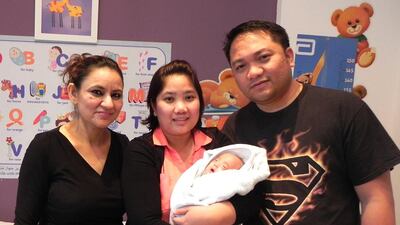DUBAI // “Miracle baby” Nicholas Sacramento is ready to go home to his parents.
Nicholas, weighing only 530 grams when he was born 17 weeks early, is one of the most premature babies to survive in the UAE.
His Filipino parents Christopher and Susie have endured an anxious wait to see if their son would pull through.
But his four-month stay at Zulekha Hospital’s neonatal intensive-care unit in Dubai is over and his life at home with his mum and dad in Al Nadha 2 is just beginning.
“We stayed in hospital for almost four months,” Christopher says. “It was long and very emotional. It was challenging but a miracle.”
Susie was rushed into hospital after 23 weeks of what is normally a cycle of about 40 weeks.
Thanks to the care in his first hours of life, Nicholas escaped the brain damage common in such premature babies.
The Sacramentos have written a letter of thanks to the Zulekha Hospital staff.
“You have a great team – a team you can trust and consider a family,” the letter says. “Not all patients see your team pray for all the babies but we see them do it every day.
“Your team have the passion for their duties and responsibilities. But most of all, they have the heart, they share the same pain, they share their happiness, they share their love.”
Shortly after birth, doctors worried that Nicholas’s skin would tear at the slightest touch so contact with his parents was restricted.
Now he weighs 1.9kg, is growing stronger every day and should live a normal life, although doctors will continue to monitor his progress closely.
Nicholas also avoided damage to his eyes and lung function, both of which can also be an issue in “micro premature” babies, or those who weigh less than 900g.
He is one of about 15 million babies around the world to be born prematurely – or before 37 weeks of gestation – each year.
Figures from the World Health Organisation suggest the number of premature babies is rising globally, although the reason is unclear.
Multiple pregnancies, infections and chronic health conditions such as diabetes and high blood pressure can all be factors, although clear cause is seldom identified.
Consultant neonatologist Dr Monika Kaushal says the early care Nicholas received was critical to his survival chances.
“Nicholas is likely to be the most premature baby to survive in this country,” Dr Kaushal says. “The chance of survival and normal development for a 23-week preterm infant is normally very bleak.
“While the first ‘golden hour’ after birth is crucial for premature babies, this is reduced to a ‘golden 10 minutes’ in neonatal care.”
Nicholas was given medicine for his lungs, equipment for temperature maintenance and was hooked up to a ventilator. He survived despite having immature lungs, immature gut, brain and skin, fragile bones and infections.
“We could not touch him as his skin would tear instantly,” Dr Kaushal says.
More than 60 per cent of preterm births occur in Africa and South Asia. Premature risk ranges between 5 and 18 per cent of all babies born and is the leading cause of death among children under 5. It was responsible for almost 1 million deaths in 2013.
But doctors claim three-quarters of premature babies could be saved with cost-effective interventions.
All but three of the 65 countries with reliable data have experienced an increase in preterm birth rates over the past 20 years.
Figures published in UK medical journal The Lancet in 2010 showed Malawi had the highest rate of premature births, with 18.1 for every 100. India had the highest recorded number, with more than 3.5 million a year, followed by China with about 1.17 million.
nwebster@thenational.ae


